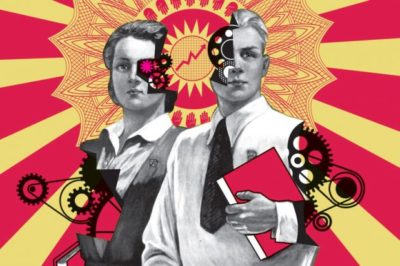Ronald Purser’s recent article in Current Affairs, “Against Managerialism,” brought to mind for me a common motivation for socialism. It’s one we easily forget, even more so when we dive into the weeds of talking politics or running a socialist org.
I’m talking about economic democracy – the idea that regular, everyday workers are the most qualified to run their workplace. When I think about socialism – really reflect on it – I see economic democracy at the heart of it. And to create a real economic democracy requires us to rid the world – and ourselves – of managerialism.
Let’s say a bit more.
Against Managerialism
Managerialism amounts to propping up an elite group of professionals alleged to be uniquely qualified to run things. They – and only they – hold the skills to make basic decisions about how things ought to go. It’s really all about power – the power of some people to structure and change an org and the systems and people it touches.
Purser presents managerialism as an ideology that structures capitalism, both in its modern, neoliberal form and in the centralized, corporate form that dominated the world from the 1950s to the 1980s. In each of its forms since the early 20th century, capitalism created an elite manager class. This class, unlike in early capitalism, stands apart as an entity separate from the owners.
Managers manage. As do many Vice Presidents, Provosts, CEOs, and so on. Collectively, they dictate how the world works, even though they may not ‘own the means of production.’
Managerialism obviously applies to companies. After all, that’s where the term originated. But we can apply it to many areas of life, from political orgs to NGOs, social groups, and other dynamics. It appears in each of these types of orgs in unique ways, while still sharing a common focus on a professional elite.
Managerialism and Socialism
As with other ideologies, managerialism isn’t really a driver of anything. It serves the function of justifying the deeper forces that do drive things.
Purser misses this in his article. In the cases he discusses, the deeper forces at play keep workers from key levers of control in a company. Companies want to avoid a situation where workers threaten actual management power, as Purser correctly identifies. However, managerialism also serves to steer workers away from broader notions of workplace democracy.
The sort of workplace democracy that might supplant private ownership and control of companies.
In other words, managerialism serves the function of preventing economic democracy. As a broad system. The class conflicts and struggles over economic democracy sit at the deepest level. Managerialism is the handmaiden of capital in those struggles.
As socialists, then, we should see managerialism as a key threat. We have to combat it, and we’re often not very good at fighting it.
Indeed, we miss on both sides. Actually existing ‘socialist states’ degenerated into bureaucratic centralism, unleashing all the horrors of the USSR and other versions. And on the other side of things, socialist orgs degenerate into a ‘tyranny of structurelessness‘ that serves our goals no better.
In our various orgs, one of our key tasks as socialists is to generate and replicate structures of political and economic democracy that avoid the dangers of managerialism. But we need to do so without degenerating into either authoritarianism or lack of healthy, coordinated initiative.

Leave a Reply